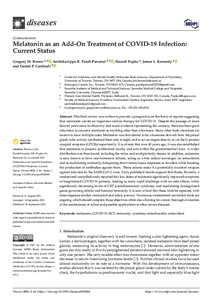Por favor, use este identificador para citar o enlazar este ítem:
https://repositorio.uca.edu.ar/handle/123456789/13682| Título: | Melatonin as an add-on treatment of COVID-19 infection : current status | Autor: | Brown, Gregory M. Pandi Perumal, Seithikurippu R. Pupko, Harold Kennedy, James L. Cardinali, Daniel Pedro |
Palabras clave: | MELATONINA; COVID-19; INMUNIDAD; CITOCINAS; MITOCONDRIAS; ANTIOXIDANTES | Fecha de publicación: | 2021 | Editorial: | MDPI | Cita: | Brown, G. M. et al. Melatonin as an add-on treatment of COVID-19 infection : current status [en línea]. Diseases. 2021, 9 (64). doi: 10.3390/diseases9030064. Disponible en: https://repositorio.uca.edu.ar/handle/123456789/13682 | Resumen: | Abstract: This brief review was written to provide a perspective on the flurry of reports suggesting that melatonin can be an important add-on therapy for COVID-19. Despite the passage of more than 60 years since its discovery and much evidence representing the contrary, there has been great reluctance to conceive melatonin as anything other than a hormone. Many other body chemicals are known to have multiple roles. Melatonin was first shown to be a hormone derived from the pineal gland, to be actively synthesized there only at night, and to act on targets directly or via the G-proteincoupled receptors (GPCRs) superfamily. It is of note that over 40 years ago, it was also established that melatonin is present, synthesized locally, and acts within the gastrointestinal tract. A wider distribution was then found, including the retina and multiple body tissues. In addition, melatonin is now known to have non-hormonal actions, acting as a free radical scavenger, an antioxidant, and as modulating immunity, dampening down innate tissue responses to invaders while boosting the production of antibodies against them. These actions make it a potentially excellent weapon against infection by the SARS-CoV-2 virus. Early published results support that thesis. Recently, a randomized controlled study reported that low doses of melatonin significantly improved symptoms in hospitalized COVID-19 patients, leading to more rapid discharge with no side effects, while significantly decreasing levels of CRP, proinflammatory cytokines, and modulating dysregulated genes governing cellular and humoral immunity. It is now critical that these trials be repeated, with dose-response studies conducted and safety proven. Numerous randomized controlled trials are ongoing, which should complete those objectives while also allowing for a more thorough evaluation of the mechanisms of action and possible applications to other severe diseases. | URI: | https://repositorio.uca.edu.ar/handle/123456789/13682 | ISSN: | 2079- 9721 | Disciplina: | MEDICINA | DOI: | 10.3390/diseases9030064 | Derechos: | Acceso abierto | Fuente: | Diseases. 2021, 9 (64) |
| Aparece en las colecciones: | Artículos Artículos |
Ficheros en este ítem:
| Fichero | Descripción | Tamaño | Formato | |
|---|---|---|---|---|
| melatonin-as-an-add-on.pdf | 222,25 kB | Adobe PDF |  Visualizar/Abrir |
Visualizaciones de página(s)
64
comprobado en 27-abr-2024
Descarga(s)
89
comprobado en 27-abr-2024
Google ScholarTM
Ver en Google Scholar
Altmetric
Altmetric
Este ítem está sujeto a una Licencia Creative Commons

